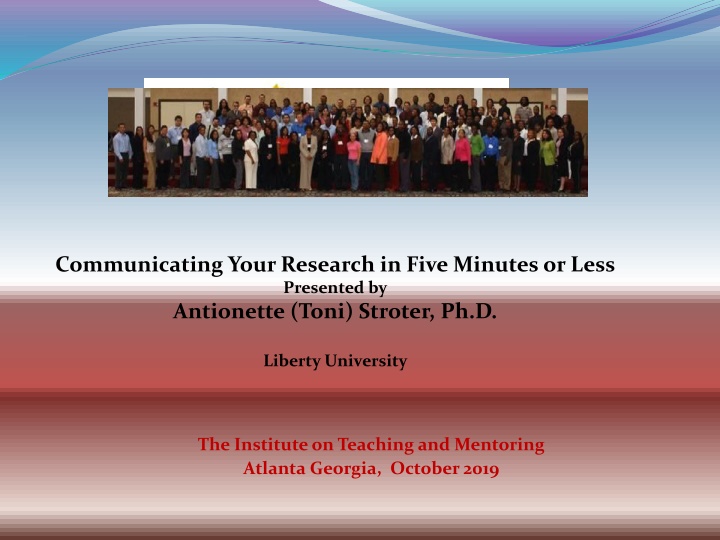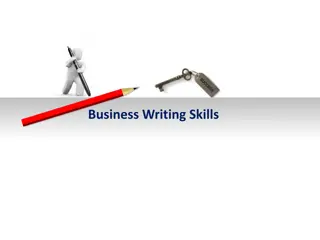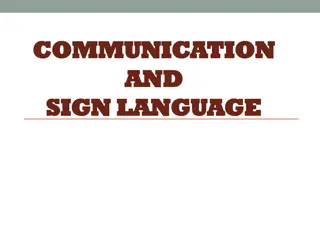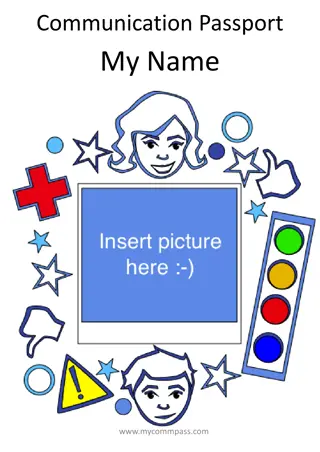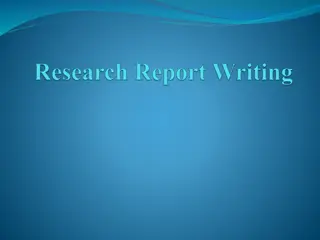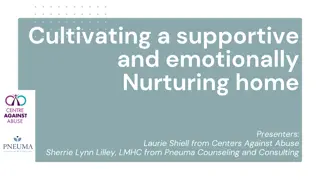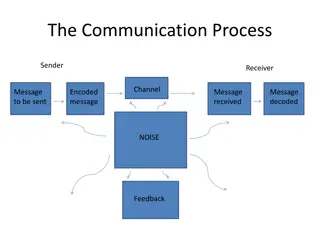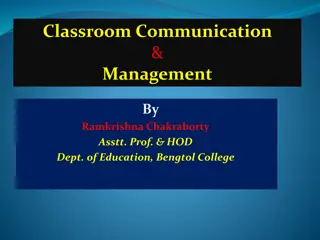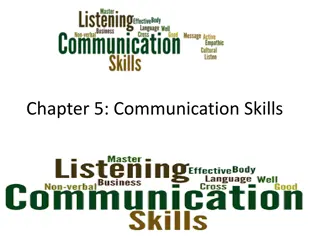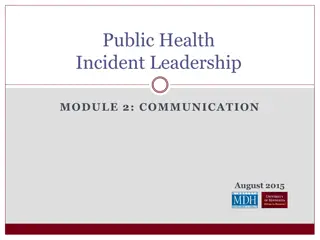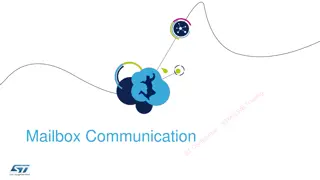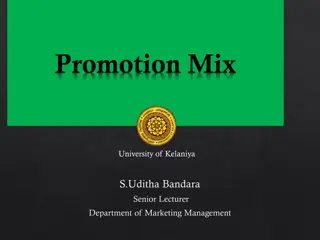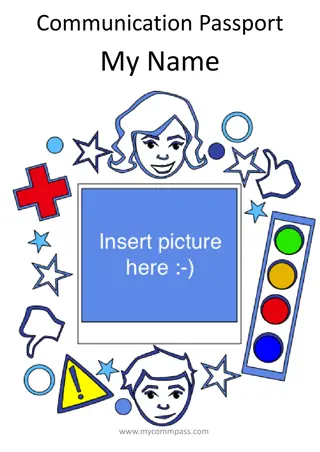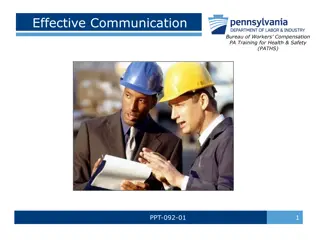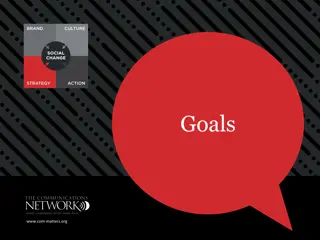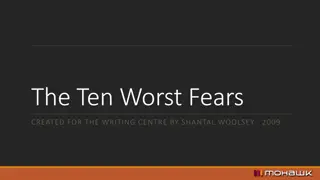Effective Research Communication Tips by Dr. Antionette Stroter
Dr. Antionette Stroter, Ph.D., shares valuable insights on communicating research effectively in presentations. Her tips include being aware of the audience, engaging effectively, and maintaining good communication practices. The presentation emphasizes clear speech, audience awareness, and confident delivery to make a lasting impact in a short amount of time.
Download Presentation

Please find below an Image/Link to download the presentation.
The content on the website is provided AS IS for your information and personal use only. It may not be sold, licensed, or shared on other websites without obtaining consent from the author.If you encounter any issues during the download, it is possible that the publisher has removed the file from their server.
You are allowed to download the files provided on this website for personal or commercial use, subject to the condition that they are used lawfully. All files are the property of their respective owners.
The content on the website is provided AS IS for your information and personal use only. It may not be sold, licensed, or shared on other websites without obtaining consent from the author.
E N D
Presentation Transcript
Communicating Your Research in Five Minutes or Less Presented by Antionette (Toni) Stroter, Ph.D. Liberty University The Institute on Teaching and Mentoring Atlanta Georgia, October 2019
http://www.sreb.org/uploads/photos/2009/11/2009111614321991/newspaper_keyboard.jpg.tn.jpghttp://www.sreb.org/uploads/photos/2009/11/2009111614321991/newspaper_keyboard.jpg.tn.jpg WHAT? AND SO WHAT?? http://t2.gstatic.com/images?q=tbn:ANd9GcQU8qKkqoU9ocHQcp1arcJ5quYB2GYke8EUJYhF1VX70JEtpsl8
http://t0.gstatic.com/images?q=tbn:ANd9GcTQ_AQS3MT0vvnPZeFh8mBVCx4rtEpS-Hyx_og5BxJMWjb-DRj7http://t0.gstatic.com/images?q=tbn:ANd9GcTQ_AQS3MT0vvnPZeFh8mBVCx4rtEpS-Hyx_og5BxJMWjb-DRj7 SO WHY?? Money, Money, Money (what we all might say) Job (what a job seeker or job keeper might say) Publications (what an editor might say) Improve Society ( what a legislator might say) Grant funding (what a university researcher) Graduation (what a graduate student might say)
PRESENTATIONAGENDA Effective communication Be aware of your audience Know your audience Engage your audience Use the time effectively Practice your research aloud 3 important questions about your research Practice Concluding Remarks 1) 2) 3) 4) 5) 6) 7) 8) 9)
EFFECTIVE COMMUNICATION Always speak up Always speak clearly (no mumbling) Always pace yourself (don t talk to fast or to slow) Always watch your tone Always maintain good eye contact with the audience or the individual Always keep your energy level high (at least appear to be excited about your work) Always be confident!!!! (remember that more than likely you know your work better than the audience or the individual) The Institute on Teaching and Mentoring
BE AWARE OF YOUR AUDIENCE How technical my talk should be depends on the audience. Is the audience primarily composed of specialist in my area? Am I speaking to a non-specialist but an academic in the general area? http://t1.gstatic.com/images?q=tbn:ANd9GcSJQytcsvFsfIvDn_vEgINZHrEx8pvrc4FrhuCWqAgA2W6HcO6eTQ How would I describe my work to the average person e.g., Family Friends
KNOW YOUR AUDIENCE Experts: Individuals with a relatively high level of disciplinary knowledge and interest. Can engage in in-depth conversation; using technical language in the discussion (Thomson). Wide-ranging discipline: Individuals who may have some general familiarity with the field (or in related disciplines), but not enough to be considered an expert. Using minimal technical language is best (Thomson). General audience: Individuals with little to no familiarity with the subject matter. Explain your work to them in the most basic way possible, completely avoiding technical language (Thomson).
ENGAGE THE AUDIENCE Know yourself (strengths and weaknesses) Watch your eye contact and facial expression (smile) Be aware of your body language (don t let it do all the talking for or against you) Be enthusiastic about your work Don t be cocky Don t start by apologizing about your delivery or any aspect or result of your research/delivery. (It takes up time, diverts the focus or attention on your apology (or what you apologized for), and possibly sets a negative tone for what you are about to say next).
USE THE TIME EFFECTIVELY There is difference between what you can share in: (a) 5 minutes in elevator , (b) dinner or lunch, (c) 30 to 45 minute job interview (d) hallway conversation. If you really understand your research , you can explain it in the time given. Sometimes you only have a few seconds (title should work in those instances). Time yourself (a) 1 minute, (b) 3 minutes, and (c) 5 minutes. Keep in mind what is your main idea and what do you want your audience to remember or walk away with.
Practice Your Research Aloud with varying audiences Practice out loud (critique yourself) Listen carefully to yourself (record video or audio and play back) Practice with a friend Practice with a colleague Practice with a supervisor (someone in your field) Listen to their feedback (make adjustments) Keep the technical language to a minimum depending on the audience PRACTICE TIPS How would you tell your parents about your day at school? How would you explain to a friend how to bake cake or ride a bike? How would you take advantage of the opportunity to tell your side of the story?
3 IMPORTANT QUESTIONS ABOUT MY RESEARCH WHAT is it about? http://t3.gstatic.com/images?q=tbn:ANd9GcRKngImSfpqdvrfiiZiaIjgqjrvVz79vXjw6oiAurYahvcY9ar_HA WHY is it important? HOW is it accomplished?
WHAT IS IT ABOUT? Don t get carried away with trying to tell everything about your research instead focus on the relevant points for describing and studying the problem (Thomson). Be realistic. Most of the audience will only remember a fraction of what you say (Thomson). The audience may only have a vague idea of what you are talking about by the time you are half way through your presentation (Thomson). Keeping it concise, simple and to the point will help keep the attention of the audience a little longer and perhaps they will remember what you want them to remember (Thomson). ALWAYS THINK ABOUT YOUR AUDIENCE You do not have to defend your research (Thomson).
WHY IS IT IMPORTANT? What is the big picture? The overall picture, what are the main points? How would you describe the merit of your work to a funding agency or potential employer? How does your work stand in comparison to similar work in the http://t1.gstatic.com/images?q=tbn:ANd9GcRX8cjppwyDF9VwAS3rAYf6SYr4QzOqHe9dvT0DJ6yJX7Bo3hqWByQoZ4tsbw field?
HOW IS IT ACCOMPLISHED? How do you know what to do? How would you explain your methods concisely? http://t2.gstatic.com/images?q=tbn:ANd9GcSXAmZqByT4wUC0ctdZh8qYlWzTdSbshL6vLB2dv_vilUlEigoz How can you avoid being boring ? How would you address if time permits, where you currently are in your?
CONCLUDING REMARKS KNOW YOUR AUDIENCE BE CONFIDENT AND CONCISE REMEMBER THE 3 QUESTIONS ABOUT YOUR RESEARH 1. WHAT 2. WHY 3. HOW
PRACTICE LETS GIVE IT A TRY PRACTICE PRACTICE PRACTICE The Institute on Teaching and Mentoring
DISCUSSION & QUESTIONS
CONTACT INFORMATION Presenter (2011 - 2016) Dr. Antionette (Toni), Stroter Director, Research & Evaluataion Assistant Professor, Liberty University Email: adstroter@liberty.edu Presenter (2010 and previous years) & Contributor (2011) Dr. Kimani C. Toussaint, Jr. University of Illinois at Urbana-Champaign Contributor (2010 and previous years) Dr. Emorica Hill Harvard Medical School Office for Diversity and Community Partnership
